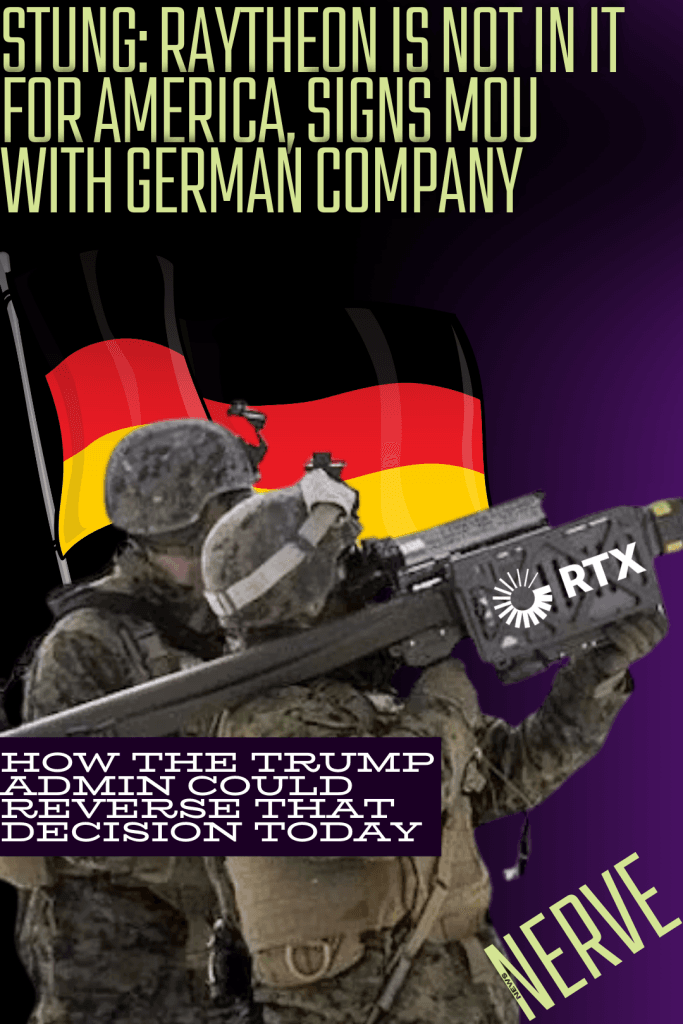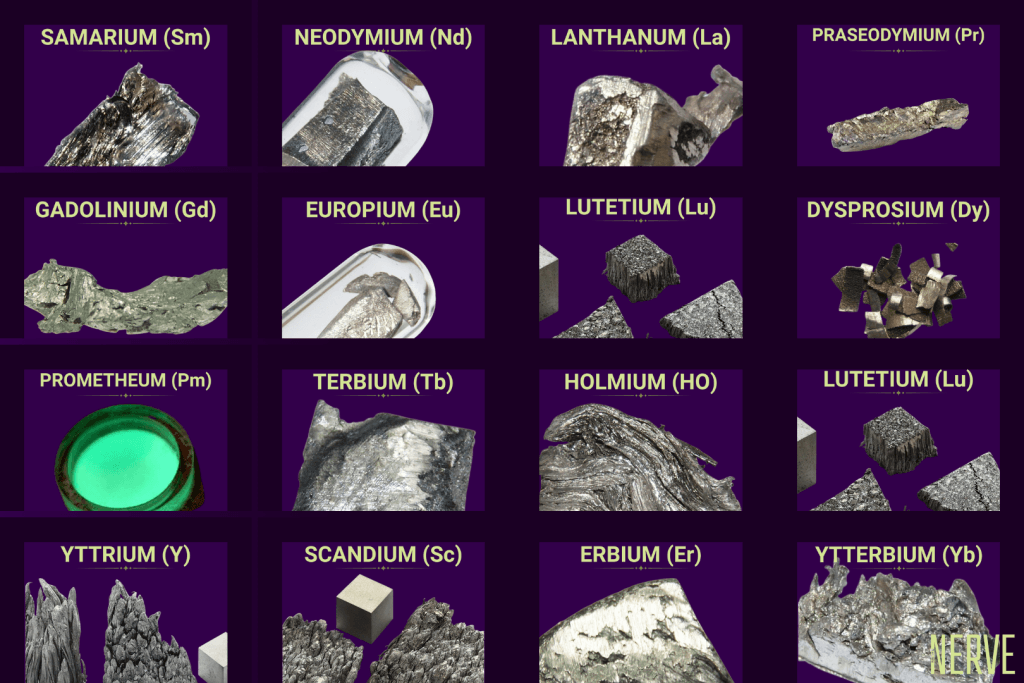Raytheon’s stinger deal with Germany is a slap in the face to the American worker.
America’s Defense Giants Are Undermining Trump’s Industrial Renaissance
Raytheon’s decision to partner with German defense contractor Diehl Defence for Stinger missile production represents nothing less than a betrayal of American workers and a direct sabotage of President Trump’s re-industrialization agenda. At the precise moment when our nation is fighting a global trade war to bring manufacturing jobs home, one of America’s premier defense contractors is handing over production of our most sought-after weapons system to foreign factories.
It’s economic treason.
The Context: America’s Fight for Manufacturing Supremacy
Re-industrializing America is both an economic and national security imperative. Trump’s administration has implemented comprehensive tariffs, declared national emergencies over trade deficits, and explicitly stated that decades of globalization have “hollowed out our manufacturing base” and “rendered our defense-industrial base dependent on foreign adversaries.”
The White House has repeatedly emphasized that “Made in America” is not merely a slogan but a fundamental economic strategy. Trump’s tariff regime has already secured billions in manufacturing commitments from companies seeking to avoid import duties by producing domestically. Steel manufacturers alone have announced nearly $20 billion in U.S. investments, with companies like Hyundai Steel committing $5.8 billion for a Louisiana facility specifically because of Trump’s trade policies.
The message from this administration could not be clearer: when global demand exists for American products, that production must benefit American workers, not foreign competitors.
The Stinger Advantage: America’s Unmatched Leverage
The FIM-92 Stinger represents the perfect case study for why Raytheon’s decision is so unconscionable. This is not a commodity product facing stiff international competition. The Stinger is a uniquely American asset with overwhelming global dominance and virtually no viable alternatives.
Twenty-four countries, including Germany and nine other NATO members, rely on the Stinger system. Recent massive orders underscore this dependency: Morocco just approved $825 million for Stinger Block I missiles, while NATO’s procurement agency secured deals for 940 missiles for Germany, Italy, and the Netherlands. Raytheon officials themselves acknowledge “historically high demand” due to the system’s “unrivaled effectiveness.”
This is precisely the kind of strategic advantage Trump’s trade policy is designed to exploit.
This is precisely the kind of strategic advantage Trump’s trade policy is designed to exploit. When foreign nations desperately need American technology and have no alternatives, basic economic logic demands that production remain in America to maximize employment and industrial capacity benefits for our workers.
Instead, Raytheon is voluntarily surrendering this leverage by allowing German factories to capture production that rightfully belongs in American facilities.
The Jobs That Won’t Come Home
Manufacturing jobs are not abstract economic statistics. They are the foundation of middle-class prosperity that Trump’s policies are designed to restore. The Bureau of Labor Statistics projects a shortage of nearly half a million skilled manufacturing workers over the next decade, representing exactly the kind of well-paying industrial employment that communities across America desperately need.
Every Stinger missile component produced in Germany rather than Michigan, Ohio, or Alabama represents lost wages for American workers. Every German engineer employed on Stinger production instead of their American counterpart undermines our domestic industrial base. Every foreign factory that benefits from American innovation is a facility that could have been built in an American town struggling with the legacy of deindustrialization.
Diehl Defence employs 4,500 people and generates over $2 billion in annual sales. That’s exactly the kind of employment and economic activity that should be flowing to American communities, not German ones.
A Direct Assault on Trump’s Trade Strategy
This partnership represents a fundamental contradiction of Trump’s trade war principles. While the President imposes crushing tariffs to force foreign production back to American soil, Raytheon is voluntarily moving American production overseas. While Trump threatens 35% tariffs on countries that don’t eliminate trade barriers, Raytheon is handing Germany a manufacturing windfall that will strengthen their industrial base at our expense.
Trump’s Commerce and Treasury Departments are working around the clock to identify and punish foreign countries for unfair trade practices that disadvantage American workers. Meanwhile, one of America’s largest defense contractors is actively engaging in the same behavior, voluntarily transferring American manufacturing capability to foreign competitors.
This sends precisely the wrong message to both allies and adversaries. If American companies won’t prioritize American workers even when they possess overwhelming market advantages, why should foreign governments take our trade demands seriously?
Industrial Offsets Are Irrelevant When You Hold All The Cards
Raytheon will undoubtedly defend this partnership by invoking “industrial offsets” and claiming that foreign customers demand local production as part of major weapons deals. This argument is not just weak, it’s intellectually dishonest given the unique market position of the Stinger system.
Industrial offsets made sense in competitive markets where customers had alternatives and could leverage competing suppliers against each other. But the Stinger faces no meaningful competition. When Germany needs short-range air defense systems that actually work, they don’t have a viable Plan B. When NATO allies require proven anti-aircraft capabilities for their forces, there is no substitute for American Stinger technology.
This gives America absolute negotiating leverage. Countries desperate for Stinger missiles are in no position to make demands about production location. If Germany wants access to the world’s most effective man-portable air defense system, they should be grateful to receive it regardless of where it’s manufactured. The notion that we must accommodate their industrial offset demands is backwards thinking that surrenders American leverage for no strategic gain.
Moreover, any offset requirements become meaningless when the alternative is no access to critical defense capabilities. European nations facing real security threats aren’t going to reject Stinger purchases because the missiles are made in Arizona instead of Bavaria. They need the capability too desperately to play hardball over production location.
Trump’s trade strategy has repeatedly demonstrated this principle: when America controls essential technology or resources, we dictate terms. We don’t negotiate away our advantages to accommodate foreign preferences for local production.
How Trump Should Shut Down This Betrayal
The good news is that the Trump administration possesses overwhelming legal authority to terminate this misguided partnership immediately. The bad news is that it requires the political will to use these powers against a well-connected defense contractor.
The Raytheon-Diehl arrangement depends entirely on a complex web of export licenses and technical cooperation agreements that exist solely at the discretion of the U.S. government. Every component of German Stinger production requires State Department and Defense Department approval through International Traffic in Arms Regulations (ITAR) agreements, Manufacturing License Agreements (MLAs), and Technical Assistance Agreements (TAAs).
Under ITAR Section 124.1, these agreements “may not enter into force without the prior written approval” of the State Department’s Directorate of Defense Trade Controls (DDTC). More importantly, under Section 126.7, DDTC can “deny, revoke, suspend or amend approvals without prior notice for national security/foreign policy reasons.” The process is straightforward: State issues a Section 126.7 action letter, the MLA/TAA authority evaporates, and any further tech transfer becomes an ITAR violation.
Similarly, the Defense Security Cooperation Agency (DSCA) controls Foreign Military Sales channels that supply critical Stinger components to European allies. Washington can suspend or cancel Letters of Offer and Acceptance “under unusual and compelling circumstances” in the U.S. national interest. When the guidance-section supply dries up, German production lines halt immediately.
The Trump administration should also conduct “license hygiene” by revoking any case-specific Defense Service Provider licenses for Stinger hardware and technical data that exist outside formal agreements. These represent regulatory loose ends that enable unauthorized technology transfer.
For maximum impact, the administration could pursue diplomatic cleanup by terminating or superseding the 1983 NATO Memorandum of Understanding that originally authorized Stinger co-production arrangements. While not necessary to stop current production, this would send an unmistakable signal about America’s new approach to defending its technological advantages.
The beauty of this approach is its surgical precision. Unlike broad tariffs that affect entire industries, targeted export controls can shut down specific foreign production arrangements without disrupting legitimate American business or allied relationships. Raytheon would quickly discover that their German partnership is worthless without American government cooperation.
The Path Forward: America First Means America Only
Raytheon’s board of directors must immediately reconsider this misguided partnership. Instead of enabling German manufacturing growth, the company should be announcing major expansions of American facilities to meet surging global demand. Instead of training German engineers on American technology, they should be hiring American workers and investing in American communities.
Congress should investigate whether this arrangement violates the spirit, if not the letter, of America First procurement policies. The Trump administration should consider whether companies that voluntarily offshore American manufacturing capability deserve continued defense contracts and federal support.
Most fundamentally, American defense contractors must recognize that their primary obligation is to American workers and American industrial strength, not to the convenience of foreign partners or the optimization of global supply chains.
In this new era of strategic competition and industrial revival, there is no room for half-measures. When America possesses dominant technology that the world demands, that production stays in America. When American innovation creates global opportunities, American workers must be the primary beneficiaries.
Raytheon’s executives may see this partnership as a shrewd business move, but it represents exactly the kind of globalist thinking that Trump’s revolution is designed to eliminate. In the fight for American industrial supremacy, you’re either with us or you’re against us.
And right now, Raytheon has chosen the wrong side.




